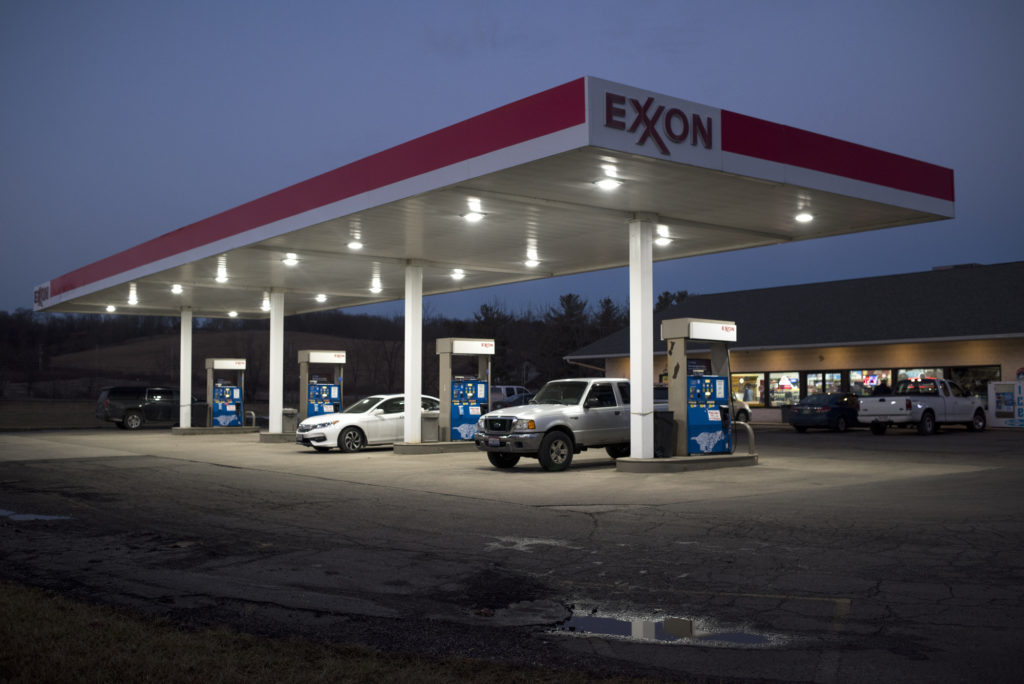
For generations of investors, Exxon Mobil Corp. has been a cornerstone of fund managers’ portfolios alongside the biggest names in corporate America. Not so much any more.
From leading the S&P 500 Index a decade ago, the company has dropped to the ninth-largest in a top 10 now dominated by technology giants. Its rivals Royal Dutch Shell Plc and Chevron Corp. aren’t faring much better, with investors demanding unusually high dividend yields to hold the stocks.
At fault, a toxic troika that combines gushing supply with fears that long-term demand will flat-line as electric vehicles and renewable energies grow, and climate change policies proliferate. And while cash flow for oil’s majors in 2018 is likely to be the highest in 12 years, investors are largely unmoved.
“Earnings have started to come through but no one believes it’s sustainable,” said Kevin Holt, who helps manage $934 billion at Invesco Ltd. in Houston. “That’s why the stocks haven’t worked even though the commodity has gone up. Everyone’s saying they don’t believe it.”
Years of elevated spending on mega projects worldwide caused costs to soar. That kept drillers from taking full advantage when oil prices were averaging about $95 a barrel in 2011-2014, and it left them exposed when a stubborn two-plus year rout took hold. In February, the weighting of energy stocks in the S&P 500 dropped to 5.5 percent, the lowest in 14 years.
Beyond the S&P, Big Oil’s weighting in global equity indices is now at a 50-year low, Goldman Sachs Group Inc. said in a March report. Of the MSCI World Index’s 100 biggest stocks, only six are oil producers.
The tepid interest in oil “is reflective of a significant paradigm shift in the global energy landscape,” Paul Cheng, an oil equities analyst at Barclays Plc in New York, said in a note to clients. “Investors, particularly generalists, seem to be growing increasingly skeptical of the long-term value of oil and gas assets given the supply and demand risks posed by shale oil and EVs.”
Big Oil’s top executives will attempt to combat these concerns this week, when they announce first-quarter results. Crude prices have climbed 51 percent in the last 10 months costs have been cut by so much that some companies are earning more at $65 a barrel than when oil was worth more than $100. The first quarter earnings reporting season starts April 25 with Statoil ASA.
In theory, the surge in cash flow should encourage institutional investors to buy shares, as it all but guarantees future dividends. Yet, there’s a strong sense among some investors of deja vu, as companies have in the past used the recovery to boost capital spending in new projects, over time squeezing their cash generation.
“There’s a degree of skepticism about how companies are going to react through an oil price upturn again,” said Iain Pyle, investment director of U.K. equities at Standard Life Aberdeen Plc, which has $929 billion under management. “The feeling is that if oil goes up they’ll give away some of that value.”
Oil executives acknowledge that it’s too soon to win back investors. Shell CEO Ben van Beurden has openly talked about a “credibility and track record gap” between the major oil companies and its shareholder base.
“We need to show a little bit longer we mean what we say in terms of capital discipline,” he told reporters last week. “This newfound religion and confidence is, to say the least, fragile.”
And yet, some banks and investors believe that everyone is so negative about Big Oil that it’s the right time to pour money back in. Goldman Sachs, for years a naysayer of the sector, has now turned its cheerleader. The aversion to oil has created “the single best investment opportunity over the next five years in the S&P,” according to Invesco’s Holt. His $13 billion Invesco Comstock Fund holds Chevron and Shell stock.
Longer term, electric vehicles and policies to combat climate change are contributing to forecasts of peak oil demand anytime from the 2030s.
Big Oil’s first quarter results are “a chance at redemption” after a poor fourth quarter of 2017, Biraj Borkhataria, a London-based analyst at RBC Capital Markets wrote in a note. Investors will reward companies whose cash generation rises at the same rate as oil prices in the period, and no new plans to raise capital spending, he said.
The five biggest listed international oil companies — Exxon, Shell, Chevron, Total SA and BP Plc — will post their highest first-quarter net income since 2014, according to data compiled by Bloomberg. So far that hasn’t translated into returns, a source of frustration for investors.
“I’m disappointed the shares haven’t been better than they’ve been,” said Martin Walker, a fund manager at Invesco in London. “But I’m a patient investor.”
Recommended for you
